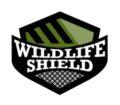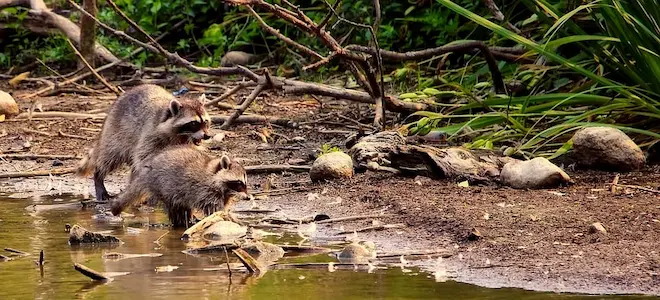Raccoons are a very common animal in Toronto, over the years they have adapted to living in urban areas. Raccoons are a nuisance, and not the easiest pests to get rid of especially if they have invaded your attic. What makes raccoons in your attic such a difficult task, is that there is ALWAYS a possibility of baby raccoons in the attic with an adult female. The young raccoons are helpless and will depend on their mother 100% for at least six weeks. Baby raccoons can’t be trapped; they need to be removed by hand. Getting rid of raccoons in your attic will always need a mix of techniques, which is why this is a job best suited for a professional raccoon removal specialist in Toronto.
The mother raccoon gives birth in March, throughout spring and early summer. During this period, she will look for a dark, warm, secure place to raise her babies. Most times, this search ends in your attic. The attic is an ideal place to bring up young raccoons, but it often creates headaches for human residents living under.
Why should I get rid of baby raccoons in my attic?
Raccoons are very destructive animals, which is why it is important to take immediate action the moment you spot them in your attic. If left to thrive in your property, raccoons have the capability of significantly damaging your attic insulation, air ducts, and vents. The mother raccoon often chews through the insulation looking for nesting material. Your attic needs insulation material to help it conserve energy during extreme weather conditions. When raccoons damage your insulation, your HVAC systems have to work harder regulating the heat or cool air, this will significantly affect your energy bills.
They will also soil your insulation with droppings reducing its effectiveness. It costs thousands of dollars repairing after raccoons and getting new insulation back. Raccoons also harbor parasites like ticks and fleas that can be easily transferred to your pets and household. They are also carriers of diseases and parasites that can be transmittedto humans such as rabies and roundworms. A scratch or bite from a raccoon infected with rabies is enough to transmit the disease.
How to get baby raccoons out of the attic
When baby raccoons are born, they are completely immobile up to 6 weeks. Meaning the only reliable way to get them out of the attic is by hand. At Raccoon Control, we begin our raccoon removal service with a thorough inspection of your attic for any babies that might be at the site. When raccoons invade your attic, they are always looking for a secure nesting site to bring up their young.
Why is it important to remove baby raccoons from the attic by hand?
During removal, most property owners will block off the entry points after spotting the raccoon left. When she returns to nurse her young and finds all entries blocked, she can cause tremendous damage to your roof structure trying to get through to her babies.
Another reason why removal by hand is effective is, sometimes, the mother raccoon is trapped and relocated to a different location only to find later that there is still a litter back in the attic. Without their mother’s care and protection, the litter will starve to death leaving an awful smell in your home.
The right thing to do is to thoroughly search for the baby raccoons when the mother steps out foraging for food. Wear protective clothing and gloves when handling the babies and put them in a cardboard box near the entry area. Lure the mother raccoon back to the entry point and seal it behind her. Naturally, the raccoon will relocate her babies one by one.
You could also use the baby raccoons as bait to trap the mother, but you need to be extremely careful, mother raccoons are very aggressive when nursing their babies, and the slightest provocation could force them to attack. Once you have successfully captured the mother raccoon and her babies, you can safely relocate them 10 miles in a wooded or forested area. It’s important to check your local government regulations before relocation. If you are uncertain of what to do, call your local wildlife removal expert for advice.
It is possible to solve a raccoon problem without trapping. One of the best methods is by implementing preventive measures.
- Discourage raccoons from feeding on your trash. If you deny access to raccoons to your trash, they have no option but to forage elsewhere for a meal. There are several ways you can do this. Get garbage bins that have locks on them; it makes it extremely hard for raccoons to open. You could also make sure that you double bag your trash, the reason raccoons are attracted to your garbage cans is they can smell its contents. Securing your garbage area is also a good method you could use to keep them off.
- Practice cleanliness. All pests are attracted by untidiness. Keep your lawn clean. If you had a picnic in the yard, avoid leaving leftovers outside overnight. If you have pets, don’t leave their food out in the lawn. If you have planted fruit trees in your backyard, make sure you collect and dispose of any felled fruits that you cannot consume. Gardens need to be properly fenced to prevent raccoons from invading your vegetables and produce.
- Scaring raccoons will also prevent them from gaining access to your property. You can install an automated sprinkler system in your lawn to scare them anytime they come near your trash or lawn. Raccoons hate noise and will keep away if they hear humans talking. You could set a radio with a talk show playing through the night in your attic or where they frequent.
- Trap the raccoons. We don’t recommend this action but if it’s the only option left then we insist that you hire a qualified and professional wildlife removal expert. Contact Raccoon Control today; our technicians will be more than happy to help you find a solution to your raccoon problem.
The Danger of Having Baby Raccoon in Attic
When a raccoon family resides in your attic they only come out to raid your trash cans in search of food. It is necessary for you to check the attic to be sure they aren’t living there. Raccoons poop and pee where they live, and if they are in the attic, you’ll need proper attic cleaning and restoration.
Removing raccoon poop in the attic is not an easy task and definitely not something you can do on your own. You’ll need to call a wildlife expert to do the job, and here’s why: It is difficult to access the attic, and even if you can safely do that without exposing yourself to infections, your attic insulation may be severely damaged and needs complete removal and replacement —you need a raccoon feces removal expert.
Article Updated: June 26, 2019

